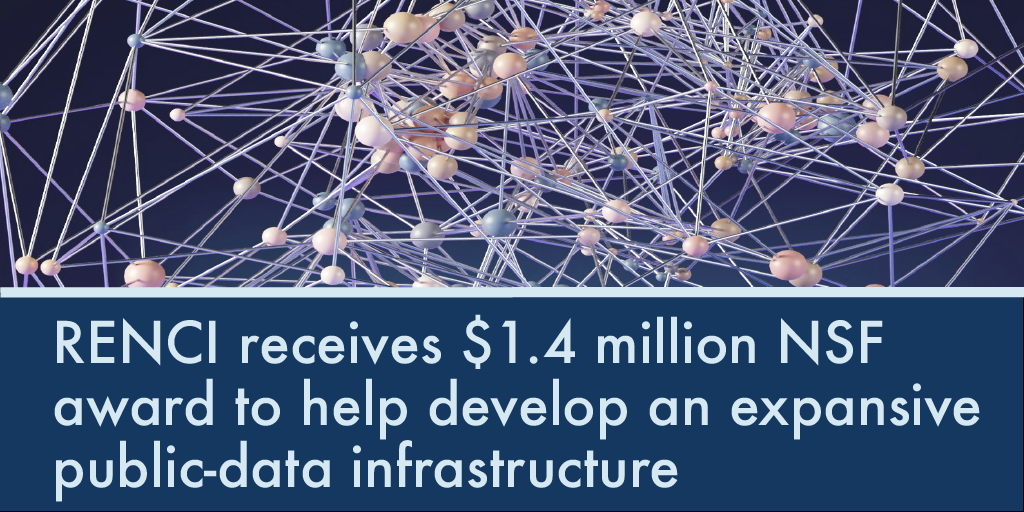
RENCI will design an interconnecting fabric that links a diverse set of knowledge graphs, helping form a prototype Open Knowledge Network to power the next information revolution
RENCI has received $1.4 million from the U.S. National Science Foundation (NSF) as part of the Building the Prototype Open Knowledge Network (Proto-OKN) program. The program is developing a prototype public-data infrastructure that will transform our ability to unlock actionable insights from data by semantically linking information about related entities.
As a publicly accessible, interconnected set of data repositories and associated knowledge graphs, the Open Knowledge Network will enable data-driven, artificial intelligence-based solutions for a broad set of societal and economic challenges. By representing relationships among real-world entities, knowledge graphs provide a powerful way to organize, represent, integrate, reuse and access data from multiple sources.
“There’s a great deal of data and knowledge out there, but because most of it exists in unstructured government repositories, the [scientific] literature or documents and other places, it’s hard for people to find and query, and, most importantly, it’s difficult to integrate,” said Chris Bizon, Director of Analytics & Data Science, who leads the RENCI team working on this project. “Proto-OKN will establish a prototype version of a system in which many different types of information could be inserted, attached or uploaded in structured ways so that users can get value out of that data, either by directly accessing it or building applications that make use of it.”
Synthesizing data to solve societal problems
The Proto-OKN awardees include 15 Theme 1 projects that will each develop a knowledge graph to provide data-centric solutions to societal challenges related to issues such as equitable water distribution, justice, carbon capture, the environment, health communication, agriculture and homelessness.
“These inaugural Proto-OKN projects will not only advance the state of the art in data and artificial intelligence, but they will also have tremendous positive impacts on the societal and economic opportunities that we see before us,” said Erwin Gianchandani, assistant director for NSF’s Directorate for Technology, Innovation and Partnerships.
RENCI is one of two Theme 2 awardees that will develop and deploy technologies that provide an interconnecting fabric linking the various knowledge graphs developed by the Theme 1 teams. Educational materials and tools for those interested in engaging with the Proto-OKN will be developed by a Theme 3 awardee.
Creating a common understanding
When considering their task, the RENCI team decided that three fabrics were needed to link the knowledge graphs. Thus, their project, called Fabric Integrating Networked Knowledge (FRINK), includes a knowledge fabric that will incorporate the tools necessary for knowledge graph integration and interoperability; a technical fabric with a cloud-based technical infrastructure for deploying and tapping into the knowledge graphs; and a social fabric that will create a common vision, standard semantics and shared protocols for OKN.
RENCI will bring its expertise in several areas to the project, including extensive experience with building and integrating knowledge graphs for the NIH Biomedical Data Translator Program, an effort to integrate multiple types of data, such as information on the signs and symptoms of disease and drug effects. Like Proto-OKN, the Biomedical Data Translator Program includes a group of independently funded project teams that must work together to create a new tool.
“RENCI has a lot of familiarity in working in consortia and across teams to create a common understanding,” said Bizon. “We are also well-versed in the technical aspects of cloud deployments, including building platforms that can run in the cloud and incorporating the ability to provide continuous integration and continuous deployment in those environments.”
Drawing on technical expertise
The FRINK project also includes two subcontracts. One is with Rada Chirkova, Professor in the Computer Science Department at North Carolina State University. She will use her expertise in knowledge graph algorithms to build analytical tools that allow people to work on the knowledge graphs and gain useful information from analyses using the system.
The other subcontract is with Andrew Su, Professor in the Department of Integrative Structural and Computational Biology at Scripps Research. He is an expert on knowledge integration and has experience with using Wikidata as a knowledge backbone to connect knowledge graphs, an approach that will be applied in this project.
“The real power of the system, we hope, is in what happens when you integrate all of these pieces of information,” said Bizon. “Thus, there will be a lot of work in defining new use cases and really discovering the value of this integrated data source.”
Once it is developed, the Proto-OKN will benefit a broad range of people and organizations — including government agencies, businesses, nonprofits, researchers and others — by providing access to integrated information for a variety of uses, such as pursuing societal and economic opportunities, driving evidence-based policies and developing novel AI capabilities.
Learn more about Proto-OKN on the program webpage: https://new.nsf.gov/funding/opportunities/building-prototype-open-knowledge-network-proto.
Read the NSF press release: https://new.nsf.gov/tip/updates/nsf-invests-first-ever-prototype-open-knowledge-network.


